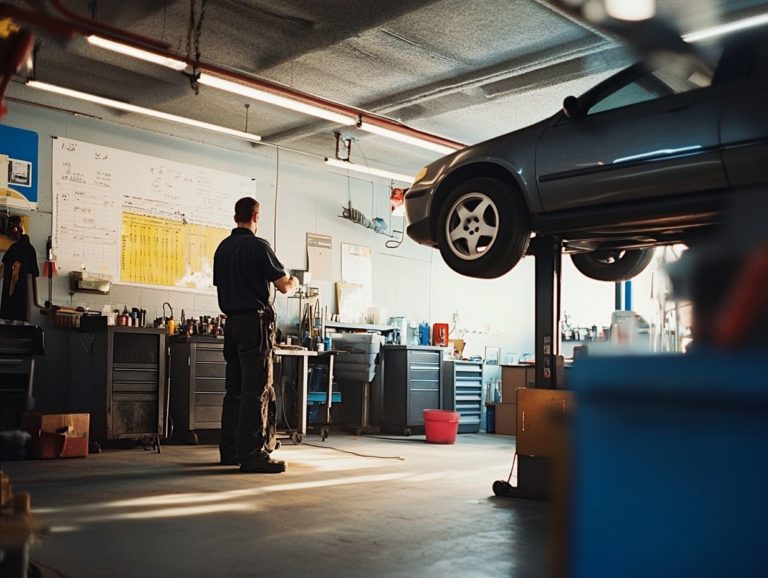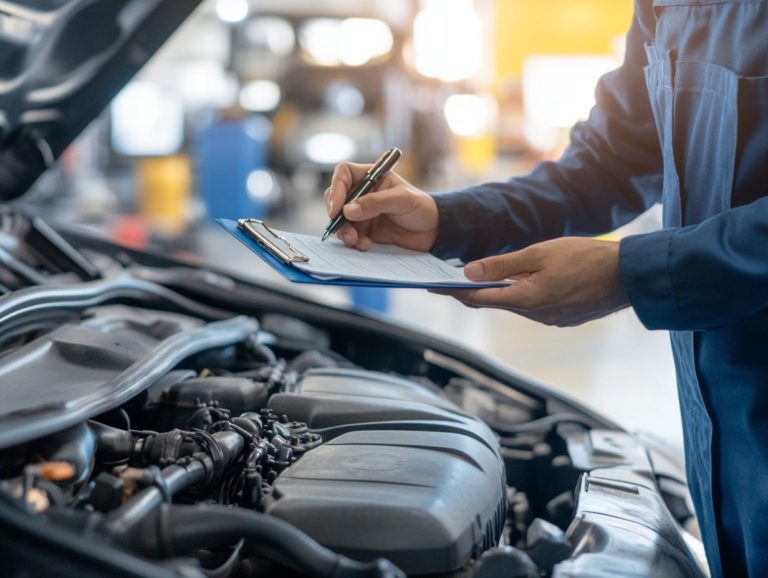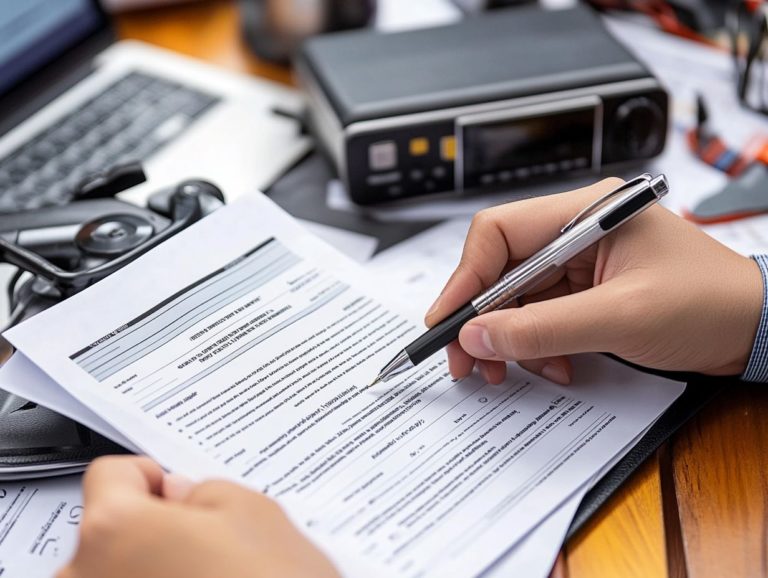Top 10 Car Maintenance Tips for Beginners
Car maintenance might seem a bit intimidating, particularly if you’re just starting out. However, it doesn t have to feel overwhelming. Keeping your vehicle in peak condition is achievable!
This article explores the top 10 essential car maintenance tips every new car owner should know. From checking your oil regularly to understanding proper tire inflation, these simple practices can save you time and money in the long run.
It also highlights common pitfalls to avoid and the many benefits of staying ahead of your car’s needs. Continue reading to equip yourself with the knowledge that will keep your vehicle running smoothly!
Contents
- Key Takeaways:
- 1. Check and Change Your Oil Regularly
- 2. Keep Your Tires Properly Inflated
- 3. Replace Your Air Filter
- 4. Check Your Fluid Levels
- 5. Inspect Your Brakes
- 6. Rotate Your Tires
- 7. Replace Your Windshield Wipers
- 8. Keep Your Car Clean
- 9. Pay Attention to Warning Lights
- 10. Get Regular Tune-Ups
- How Often Should You Get Your Car Serviced?
- Frequently Asked Questions
Key Takeaways:
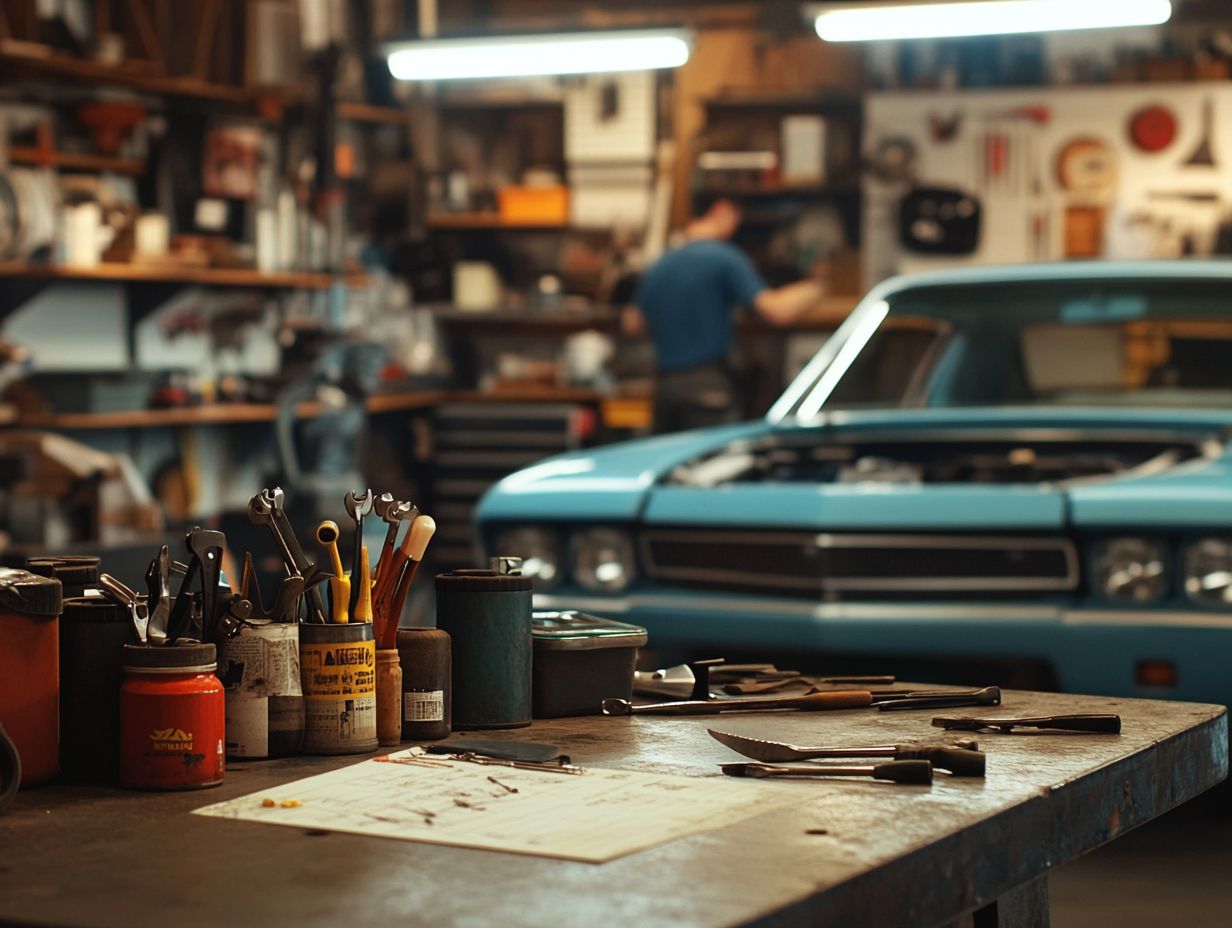
- Regularly check and change your oil to maintain engine health and prolong your car’s life.
- Properly inflate your tires to enhance fuel efficiency and prevent uneven wear.
- Swap out your air filter to keep your engine humming along and improve air quality inside your car.
1. Check and Change Your Oil Regularly
Regularly checking and changing your oil is essential for effective car maintenance. It ensures your engine runs smoothly and efficiently, ultimately extending your vehicle’s life. Think of oil as the essential fluid of your engine it lubricates moving parts, reduces friction, and helps regulate temperature.
Sticking to the recommended oil change intervals in your owner s manual can help you avoid costly repairs and keep your engine performing at its best. Don’t forget to check that oil filter it’s vital for catching contaminants!
Typically, change the oil every 5,000 to 7,500 miles, depending on whether you use synthetic or conventional oil. Choosing the right oil filter is also important as it captures debris and impurities, ensuring clean oil flows through your engine.
Keep your oil levels within the manufacturer s recommended limits. Regularly check the dipstick to monitor levels and watch for signs like a darker color or a burnt smell these could mean it s time for a change.
If you notice any unusual engine noises or a drop in performance, it may signal that the oil has degraded and needs immediate attention.
2. Keep Your Tires Properly Inflated
Maintaining proper tire pressure is essential for your vehicle’s safety and performance. Proper inflation plays a significant role in fuel efficiency, handling, and the overall lifespan of your tires. Whether under-inflated or over-inflated, tires can wear unevenly, lose traction, and heighten the risk of a blowout.
Aim to check your tire pressure at least once a month and before long trips, as temperature changes can affect inflation levels. Use a tire pressure gauge to ensure your tires are inflated to the ideal range, which generally falls between 30 and 35 PSI for most vehicles. Always refer to your manufacturer s recommendations for precise values.
Neglecting to monitor tire pressure can compromise your safety and significantly reduce your vehicle’s performance. Additionally, regular tire alignment and rotation are crucial for maintenance. These tasks promote even wear and extend tire life. Ignoring them can lead to escalating repair costs and diminish your car s reliability on the road.
3. Replace Your Air Filter
Replacing your car’s air filter is a key aspect of regular maintenance that can significantly boost your engine’s performance and fuel efficiency. A clean air filter ensures your engine gets a steady supply of clean air, which is essential for efficient fuel burning. Ignoring this simple task can lead to reduced fuel economy, higher emissions, and less power. Therefore, it s imperative to follow the manufacturer’s guidelines for replacement intervals.
To determine when it s time for a replacement, look out for signs like reduced airflow through the vents or unusual odors in the cabin. You may also notice a dip in acceleration. A clogged filter can compromise air quality, leading to discomfort during drives, especially on longer journeys.
The advantages of maintaining a clean cabin air filter include:
- Improved passenger comfort
- Reduced allergens
- A more enjoyable driving experience
With various types of air filters available such as pleated, HEPA filters, which trap tiny particles for clean air, or activated carbon filters each offers unique levels of filtration. It’s vital to keep them in check for both your engine’s performance and your passengers’ comfort.
4. Check Your Fluid Levels
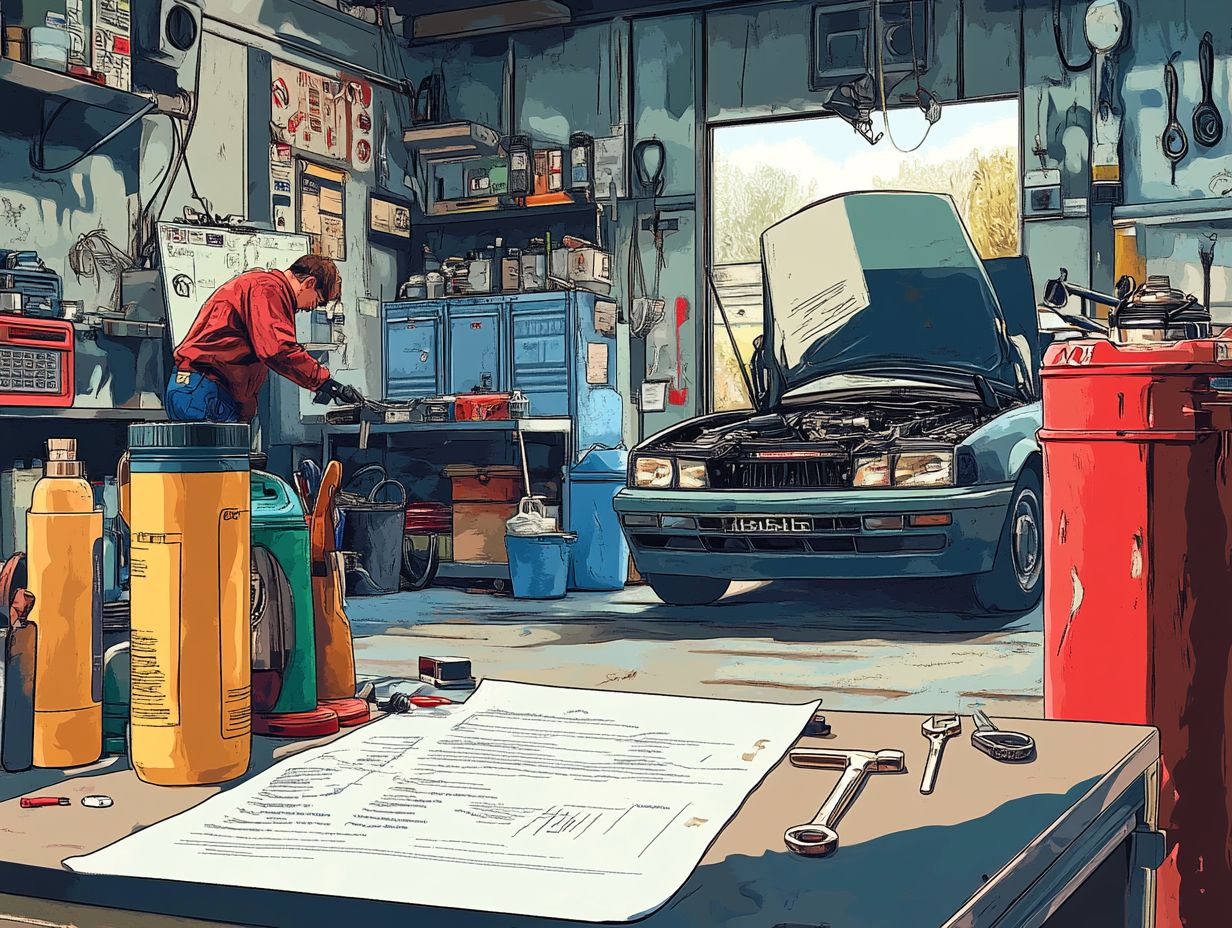
Checking your car’s fluid levels is a fundamental maintenance task that ensures all systems function properly, contributing to the overall safety and reliability of your vehicle. Key fluids contain engine oil, coolant, brake fluid, transmission fluid, and power steering fluid. Regular checks can save you from unexpected breakdowns and keep your car running smoothly!
-
To start, locate the dipstick for your engine oil. Wipe it clean, then reinserting it to check both the quantity and condition. Ideally, the oil should be a clear, amber hue without any grit.
-
Next, inspect the coolant reservoir. Ensure it s filled to the designated line and free of debris or discoloration to indicate its effectiveness.
-
In terms of brake fluid, it should maintain a transparent appearance; low levels can signal wear in the braking system.
-
For transmission fluid, a vibrant red color indicates health. A burnt smell or dark tint suggests contamination.
If you notice any fluids appearing low or compromised, topping them off is straightforward. However, if low fluid levels persist, get help from a mechanic to avoid bigger issues.
5. Inspect Your Brakes
Inspecting your brakes regularly is essential for maintaining your vehicle’s safety, as brakes are among the most critical components of any car. Worn brake pads can lead to longer stopping distances and reduced performance, increasing the risk of accidents. Monitor their condition closely.
Routine brake inspections should include checking the thickness of the brake pads, examining the rotors for wear, and ensuring that brake fluid levels remain adequate for optimal functionality.
As you drive, be attuned to common signs of brake wear. A squeaking or grinding noise when you apply the brakes often indicates that the pads are nearing the end of their lifespan. If you notice a spongy brake pedal, it may indicate air in the brake lines or low fluid levels both situations require your immediate attention.
Generally, it’s wise to replace brake pads every 30,000 to 70,000 miles. While rotors typically last longer, regular inspections are key. Engaging a professional for periodic inspections will help ensure that any issues are addressed promptly, significantly enhancing your safety on the road.
Don’t wait! Check your brakes now to keep your vehicle safe on the road.
6. Rotate Your Tires
Rotating your tires promotes even tire wear and extends their lifespan. Uneven wear can occur due to your vehicle’s weight distribution and driving conditions.
For example, if you drive a front-wheel-drive vehicle, your front tires may wear out faster. In all-wheel-drive models, the rear tires often take the brunt of the wear. Understanding the specific rotation patterns that suit your tires and vehicle ensures optimal performance.
To stay on top of your rotation schedule, mark the mileage in a calendar or set reminders on your phone. Watch for signs like vibrations while driving, uneven tread wear, or frequent alignment issues these could mean you need a rotation sooner than expected.
7. Replace Your Windshield Wipers
Don t let worn-out wipers put you at risk! Replacing them is simple and vital for your safety. Over time, wiper blades can wear down, crack, or stop working effectively, leading to diminished visibility during bad weather.
Regularly checking and replacing your windshield wipers especially before rainy or snowy seasons ensures clear sightlines and a swift response to changing road conditions.
To know when to replace your wipers, watch for signs like streaking or skipping. Choosing the correct size and type is important, as different vehicles require specific dimensions and designs for optimal performance.
Follow the manufacturer s guidelines for installation, typically found in your vehicle s manual or on the wiper packaging. Keeping your wipers in top shape enhances your driving clarity and boosts overall vehicle safety, reducing accident risks during sudden weather changes.
8. Keep Your Car Clean
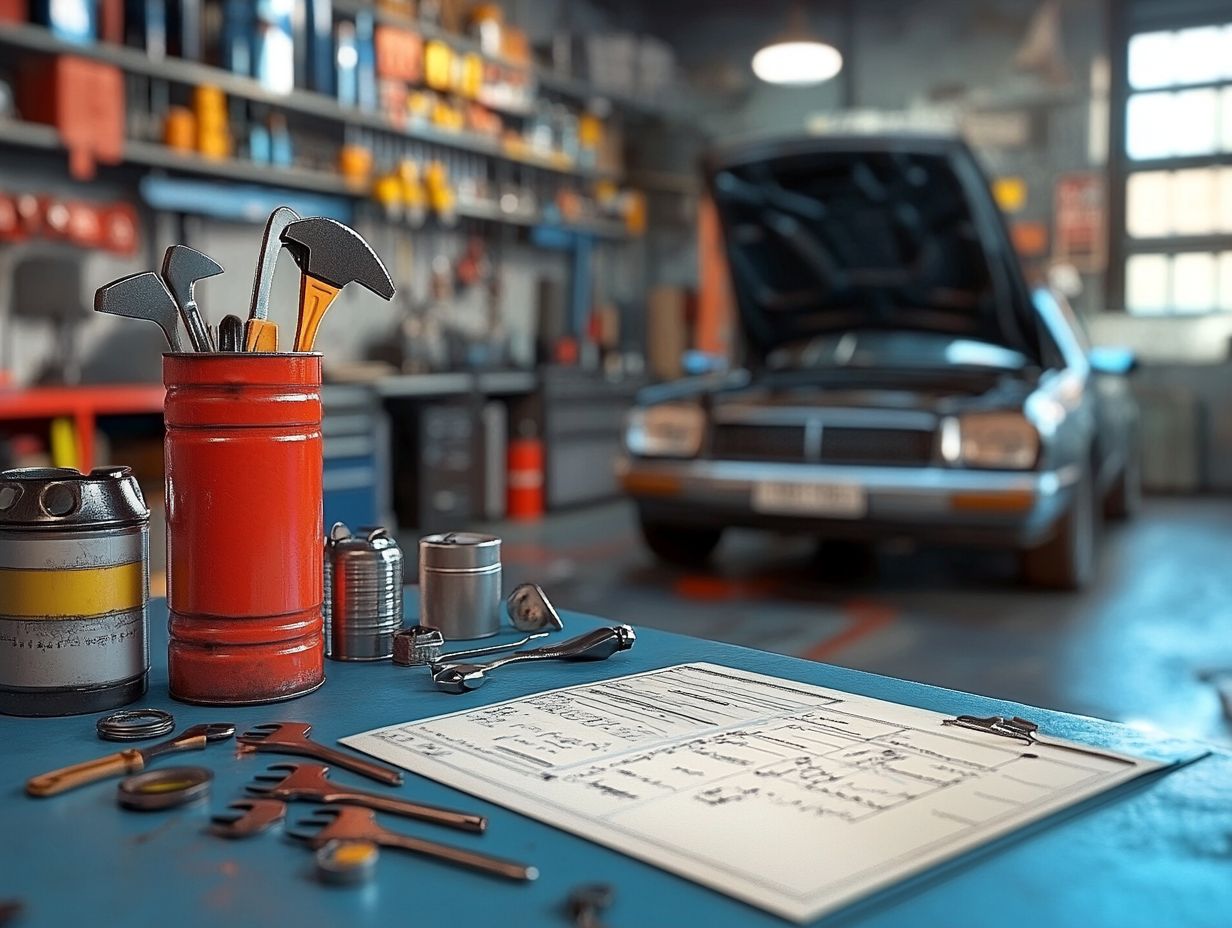
Keeping your car clean isn’t just about looking good it’s essential for maintaining its overall condition and functionality. Regular cleaning prevents rust and corrosion, particularly in the areas that trap moisture.
A clean engine bay makes it easier to spot potential issues, like leaks or worn components, so you can tackle maintenance before they become major headaches.
Both exterior and interior cleaning significantly impact your vehicle s longevity. Detailing revitalizes the exterior paint, while regular washes banish dirt and grime that can wear down the finish over time.
Inside the cabin, a tidy environment boosts comfort and enhances your driving experience, as dirt and odors can sneak up on you if you’re not careful.
Don t overlook cleaning under the hood and checking the battery for rust. This practice ensures efficient engine performance and extends battery life, helping you avoid unexpected breakdowns.
9. Pay Attention to Warning Lights
Paying close attention to the warning lights on your dashboard is crucial for responsible car maintenance. These lights signal a range of potential problems, from minor issues like low fuel to critical alerts such as engine malfunctions or brake failures.
Understanding what each warning light means allows you to take timely action whether that involves a quick check or reaching out for professional help.
Each vehicle may have different lights and meanings, so consult your owner s manual for specifics related to your model. For instance, a yellow check engine light typically indicates a non-urgent issue that requires monitoring, while a red battery light demands immediate attention as it may mean your vehicle is losing power.
Familiarize yourself with temperature warnings, as they might suggest overheating, prompting you to safely stop and inspect the situation. Knowing when to attempt a simple fix and when to contact a mechanic can save you time, money, and potential breakdowns on the road.
10. Get Regular Tune-Ups
Regular tune-ups are essential for maintaining your car s performance and efficiency. A thorough tune-up includes inspecting and replacing key components like spark plugs, belts, and filters, along with checking fluid levels and emissions. By sticking to a consistent schedule for tune-ups, you can catch potential issues early, enhance fuel efficiency, and extend your vehicle’s lifespan.
For instance, it s typically recommended that lightweight vehicles receive a thorough tune-up every 30,000 miles. Heavier models might need attention after 60,000 miles, depending on what the manufacturer suggests.
By taking these preventive steps, you not only protect your investment but also significantly lower the chances of unexpected breakdowns and expensive repairs. You can easily handle basic checks at home, like inspecting tire pressure and oil levels.
On the flip side, neglecting regular tune-ups can lead to diminished engine performance, decreased fuel economy, and ultimately, a hefty repair bill when you least expect it.
How Often Should You Get Your Car Serviced?
The frequency of car servicing is essential for ensuring both the longevity and performance of your vehicle. Neglecting regular maintenance can lead to significant issues down the line. This is especially true for fleet vehicles or those subjected to demanding conditions, such as heavy towing or off-road driving, where wear and tear can accelerate rapidly.
For example, high-performance vehicles often require more frequent oil changes and tire rotations due to their unique demands. In contrast, vehicles primarily used for long highway commutes may have different maintenance needs compared to those navigating urban traffic. Understanding your driving habits is crucial; aggressive driving can lead to faster brake wear and decreased fuel efficiency.
Maintaining a detailed service log helps you track past maintenance and allows you to anticipate future needs. This diligence ensures that service intervals are followed meticulously, leading to optimal performance and reliability for your vehicle.
What Are the Most Important Maintenance Tasks for a Beginner to Know?
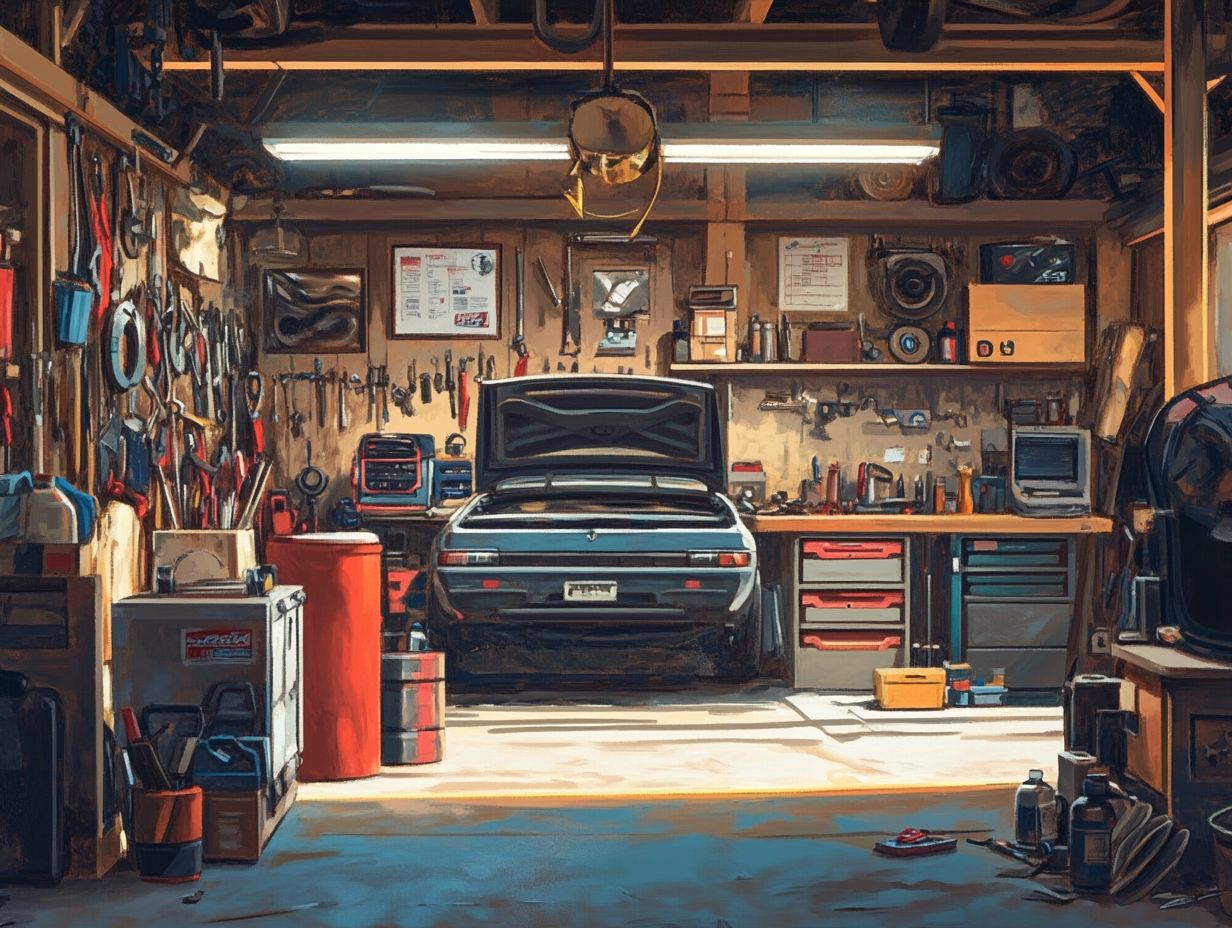
For you, understanding the essential car maintenance tasks is crucial for ensuring safety and extending the life of your vehicle. Key tasks like checking fluid levels, changing the oil, inspecting tires, and replacing air filters directly influence your vehicle’s performance and safety on the road.
By familiarizing yourself with these fundamental responsibilities, you enable yourself to take charge of your vehicle’s care, ensuring it operates efficiently and remains in excellent condition.
Investing time in learning how to perform these tasks saves you money on repairs and enhances your car’s reliability. For example, checking fluid levels is as simple as popping the hood and using a dipstick just grab a clean rag and a funnel for refills. A tire pressure gauge makes tire inspections straightforward, allowing you to catch wear before it escalates into a blowout.
Don t let maintenance tasks slide! Ignoring them can lead to serious consequences, from reduced fuel efficiency to pricey engine repairs. Establishing a checklist or maintenance schedule keeps you organized, making it easy to remember when each task is due and ensuring your vehicle remains safe and dependable.
What Are the Most Common Car Maintenance Mistakes?
Common car maintenance mistakes can lead to costly repairs and decreased vehicle performance. You must know these pitfalls to avoid costly repairs! One frequent oversight is neglecting to check fluid levels regularly, which can result in engine overheating or brake failure.
Another error is overlooking warning lights these alerts often indicate urgent issues that require immediate attention. By understanding these common mistakes, you can take proactive steps to ensure your vehicle remains in optimal condition.
For instance, delaying oil changes can cause significant engine wear and tear over time, ultimately affecting your vehicle’s lifespan. To combat this, consider setting reminders based on mileage or time intervals to help you maintain a consistent oil change schedule.
Tire maintenance often slips under the radar, but it’s crucial to regularly check tire pressure and tread depth. You can easily perform these checks with a pressure gauge and a quick visual inspection.
By implementing these practical strategies, you can enable yourself to keep your car running smoothly and learn what every driver should know about maintenance, minimizing the risk of unexpected breakdowns.
How Can Regular Maintenance Save You Money in the Long Run?
Regular maintenance is a smart choice that can save you significant amounts of money over time by preventing costly repairs and extending the lifespan of your vehicle. When you keep your vehicle in good shape, you typically experience fewer breakdowns and need to schedule major repairs less frequently.
This allows you to budget more effectively for upkeep. Plus, maintaining optimal engine performance can lead to improved fuel efficiency, which means more savings at the pump.
Take oil changes, for instance. When you change the oil regularly, you re not just being diligent; you’re actively preventing engine wear and tear, which ultimately extends your vehicle’s life and helps you avoid potentially expensive engine replacements. Research even suggests that routine oil changes can enhance engine lifespan by up to 20%.
Replacing your air filters can boost fuel economy by as much as 10%, translating to substantial savings over time especially with fuel prices on the rise. A case study from a trusted automotive service provider found that regular maintenance led to a remarkable 30% reduction in unexpected repair costs. This clearly shows that investing in consistent vehicle care pays off handsomely in both the short and long term.
What Are the Benefits of Learning Basic Car Maintenance?
Learning the basics of car maintenance brings a wealth of benefits, from deepening your understanding of vehicle care to enabling you to tackle small repairs and sidestep those pricey mechanic bills. When you familiarize yourself with essential maintenance tasks, you can effectively monitor your vehicle s condition, ensuring timely interventions when necessary.
Knowing how to maintain your car keeps you safe on the road and fosters a greater appreciation for your vehicle and its inner workings.
Mastering simple maintenance techniques can lead to impressive cost savings over time, allowing you to allocate your finances towards other important areas. With the ability to troubleshoot common issues like checking fluid levels or replacing air filters you’ll gain confidence in managing minor setbacks that may pop up on the road.
This newfound independence not only eases the stress of unexpected car troubles but also cultivates a sense of accomplishment, transforming what once seemed daunting into an enabling experience.
Start learning about car maintenance today and unlock the benefits of being a knowledgeable vehicle owner!
How Can You Keep Track of Your Car’s Maintenance Schedule?
Keeping track of your car’s maintenance schedule is essential. This helps ensure you complete all tasks on time, boosting performance and longevity.
A well-organized maintenance schedule allows you to monitor when services are due and what tasks need your attention. This is especially helpful when life gets busy! By utilizing the recommended times in your owner s manual for maintenance tasks and logging repairs and routine checks, you can significantly simplify this process.
In today s digital age, there are several effective ways to maintain this schedule. Digital apps can send you reminders and connect you with local service providers, making it seamless to stay on top of your appointments. If you prefer a more customized approach, using spreadsheets allows for detailed notes and tracking costs over time.
For those who appreciate simplicity, a traditional logbook can serve as a reliable record of past services. Regardless of the method you choose, setting timely reminders for upcoming services is essential. This proactive approach helps you avoid costly oversights, ensuring your vehicle remains in optimal condition and ultimately saving you both time and money in the long run.
Frequently Asked Questions
What are the top 10 car maintenance tips for beginners?
- Tip 1: Tire Pressure
Don t wait until it s too late make checking your tire pressure a habit for safe driving! - Tip 2: Oil Change
Change the oil and oil filter every 3,000-5,000 miles to keep the engine running smoothly. - Tip 3: Fluid Levels
Maintain all fluids (coolant, brake fluid, power steering fluid, etc.) at the recommended levels for optimal performance. - Tip 4: Air Filters
Replace air filters every 12,000-15,000 miles to improve gas mileage and protect the engine. - Tip 5: Windshield Wipers
Inspect and replace windshield wipers as needed to maintain clear visibility while driving. - Tip 6: Car Battery
Test and replace the car battery every 3-5 years to prevent unexpected breakdowns. - Tip 7: Spark Plugs
Check and replace spark plugs every 30,000-50,000 miles to ensure efficient combustion in the engine. - Tip 8: Exterior Care
Regularly clean and wax the exterior of the car to protect the paint and maintain its appearance. - Tip 9: Braking System
Inspect and replace brake pads and rotors every 25,000-70,000 miles to ensure safe braking. - Tip 10: Tune-Ups
Schedule regular tune-ups with a trusted mechanic to catch potential issues before they become major problems.
Start your car maintenance journey today to keep your vehicle in top shape!

